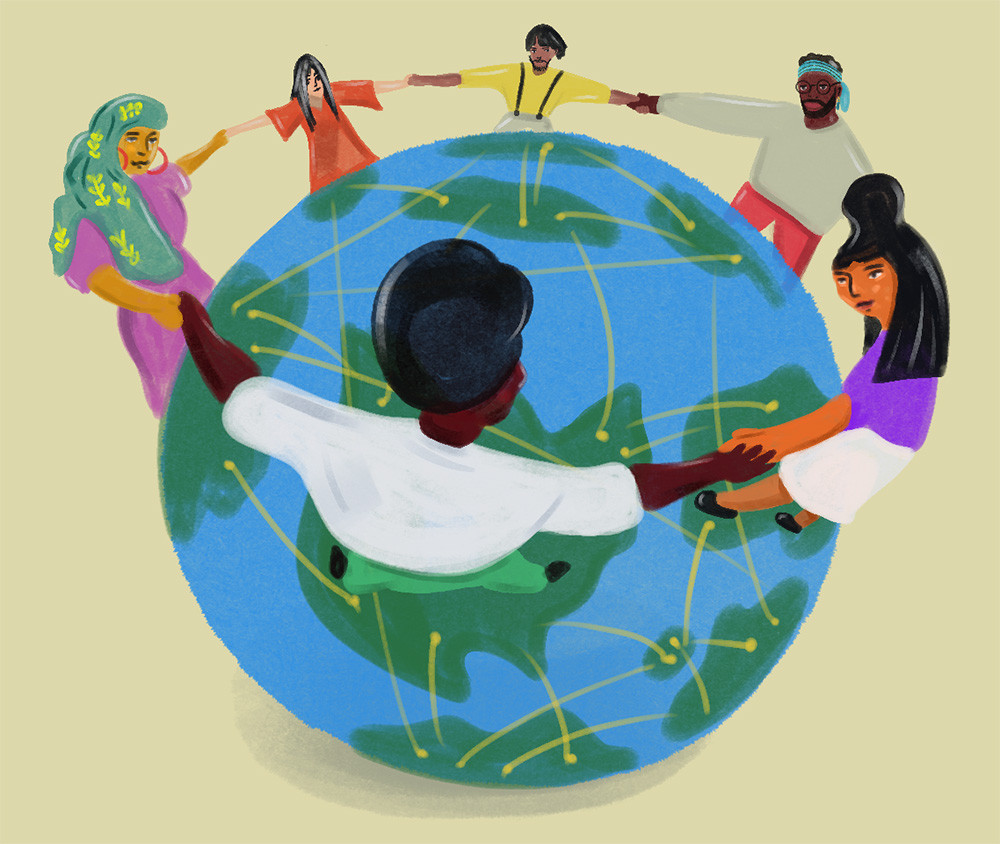 (Illustration by Raffi Marhaba, The Dream Creative)
(Illustration by Raffi Marhaba, The Dream Creative)
The legacy of colonialism has fostered structural discrimination worldwide, creating cycles of alienation and poverty among subjugated and marginalized communities. In Japan, this legacy is most visible in Okinawa, a once-independent country first occupied in the early 17th century. Okinawa’s poverty rate is about 35 percent, which is twice the national average. Okinawa also tops the nation in unemployment rates, irregular employment rates, and single-parent household ratios, while having the lowest university enrollment rate.
A telling fact behind this severe poverty is that over 70 percent of the area used for United States military facilities in Japan is concentrated in Okinawa, despite the prefecture accounting for only 0.6 percent of the country’s total land area. Although this concentration has had profound local economic and cultural implications, various government agencies have justified it by saying that it is necessary for security reasons or that it brings in national economic support in exchange for hosting the military facilities. Many people in Japanese society attribute Okinawa's poverty to the inherent conformity pressures and low self-esteem of a society, which is grounded in strong family ties and local roots. However, these explanations are superficial and deflect from the core issue. In fact, the concentration of poverty and military facilities stems from a modern form of colonialism—a structural inequity born from the power dynamics between Okinawa and mainland Japan.

Correcting structural discrimination—defined here as the normalization and unconscious perpetuation of discrimination against certain groups—presents unique challenges. Because it is so entrenched within daily life, people living within a system may not even recognize it. Tacit approval of benevolent prejudice poses a further complication. Focusing on Okinawa’s unique history and culture as distinct from mainland Japan, including praising things like its natural environment, hospitality, entertainment culture, and longevity diet, obscures structural discrimination against Okinawans. It also inadvertently contributes to the association between Okinawa's poverty and local people's values and behaviors.
Given that many Japanese fail to recognize the structural discrimination against Okinawa, undoing it involves understanding the historical context of Okinawa’s oppression and why it has endured, and how policy makers and citizens can work to restore equity to the region.
A History of Oppression
The oppression of and discrimination against Okinawa is deeply rooted in historical events. It was once an independent nation called the Ryukyu Kingdom. In 1609, however, Satsuma—one of the most powerful feudal domains in Tokugawa Japan—invaded the Kingdom and, by subjugating it, secured lucrative trade benefits and established a foothold in a region of great military and geopolitical significance. Following the fall of the Tokugawa Shogunate, the Meiji Government in Japan abolished the feudal domain system and formally incorporated Okinawa into Japanese territory by 1879.
The utilization of Okinawa became particularly pronounced during the latter stages of World War II, when the Japanese government used it as a sacrificial pawn to buy time for mainland Japan's defense. In the 1945 Battle of Okinawa, which saw as many as 100,000 civilian casualties, US forces aimed to seize Okinawa as a base for the planned invasion of Japan. When the war ended later that year, the Japanese government established a new constitution with an article renouncing war (Article 9) in exchange for allowing the United States to occupy Okinawa and, from there, facilitate its military strategies in Asia.
Importantly, the Battle of Okinawa devastated Okinawa's railways; post-war road constructions primarily served US military interests; and much agricultural land, the primary source of industry in Okinawa, was seized for the construction of military facilities. In addition, as Okinawa was under US administration, it did not receive the same level of capital investment for post-war reconstruction and economic development as mainland Japan, leading to significant delays in the development of its social and industrial infrastructure.
The Act on Special Measures for the Promotion and Development of Okinawa, passed in 1971, aimed to address the economic and social inequality between Okinawa and the rest of Japan, yet about half of the public works expenses under this act flowed back to the mainland via major construction companies.
Stymied Calls for Change
The United States continued to control Okinawa, and when the Vietnam War began, used Okinawa as a supply and launch base. During this time, anti-colonial and peace movements grew rapidly in Okinawa, and began resonating with people in mainland Japan. Both the United States and Japan had interests in calming these movements while maintaining the status quo. In 1972, the United States returned Okinawa to Japan, but it continued using bases there without the financial burden or international criticism that came with occupation. By formalizing the return, the Japanese government contained nationalist fervor while keeping Okinawa as an integral part of upholding the US-Japan security framework.
Even after Okinawa's reversion to Japan and still today, the US-Japan Status of Forces Agreement largely shields incidents of sexual assault and other acts of violence by US forces from investigation by Japanese law enforcement. Calls for a thorough revision of this agreement have been ongoing nationwide, yet no changes have been made in more than half a century.
Relocation of the bases has also remained out of reach. While successive Japanese defense ministers have acknowledged that relocating military facilities outside the prefecture would pose no military issues, they believe gaining agreement from the mainland is unrealistic. In 2009, Prime Minister Yukio Hatoyama made an election promise to relocate the US air base in Futenma outside Okinawa but retracted his own promise the following year. Still, in February 2019, over 70 percent of voters in a non-binding, prefecture-wide referendum opposed the construction of a new base at Henoko, also within Okinawa Prefecture, to replace Futenma, and citizens have been continuously showing their opposition since then. (Nagatsugu Asato, co-author of this story, served as deputy representative of the Henoko Referendum Committee, hoping that the community of Okinawa would be allowed to make such decisions for themselves.)
Toward Equity and Self-Determination
In his paper, “A Monitoring Theory of the Underclass,” Harvard Law School Professor J. Mark Ramseyer argues that minorities in Japan—including Zainichi Koreans (mostly descendants of people who moved or were forced to move to Japan during Japan’s colonial rule of Korea), the Burakumin (a historically outcast community), and the people of Okinawa—seek remedies and solutions for human rights violations primarily to secure government subsidies. He further relates poverty and perceived cultural peculiarities of Okinawa, such as lower educational attainment, higher divorce rates, and a higher number of children born out of wedlock, to the unique cultural characteristics or distinct cultural traits of Okinawa.
Local Okinawan newspapers criticized this paper as a grave instance of racism, specifically cultural racism—a type of discrimination based on differences in culture, language, religion, tradition, and customs deriving from its unique history. As such, it overlooks the role of structural discrimination and utilization that underlie Okinawa’s extreme poverty. Policies toward Okinawa have prioritized the welfare, safety, and economic growth of the mainland at the expense of local needs, and deprived Okinawans of the conditions necessary for political self-determination, as well as the means of producing essential goods and services to achieve economic independence.
Article 14, Section 1 of the Japanese Constitution states, "All citizens are equal under the law and shall not be discriminated against based on race, creed, gender, social status, or lineage." If you carefully examine the text, it conveys that cases where groups have been historically placed in a lower position due to discrimination based on specific attributes should be addressed and rectified. Many Japanese constitutional scholars and lawyers have understood this article not as a right to equality broadly, but rather equality in terms of specific individual rights. But this interpretation sidelines the fact that continuing to place the burden of hosting US military facilities on Okinawa because mainland citizens are reluctant to allow them in other areas is a denial of Okinawan citizenship, even before the occurrence of any individual rights violations. Claiming the violation of the right to equality is fundamental to redressing uneven power relations.
Structural discrimination is perpetuated by inaction, so resolving it requires that policy makers and citizens take proactive measures. First, policy makers must recognize the decision to relocate the US air base in Futenma to Henoko as a violation of Article 14, Section 1 of the Constitution, which prohibits discrimination. After more than 25 years of discussion, the decision to relocate the base within the prefecture is now final, and landfill work for the relocation is in progress. While overturning this would be politically very challenging, accepting it will only reinforce structural discrimination against Okinawa. Policy makers must also implement anti-discrimination measures, including efforts to address discrimination and establish legislation to alleviate the burden of concentration of military facilities in Okinawa.
Second, the Constitution of Japan is a peace constitution, symbolized by the war-renouncing Article 9. Policy makers must revisit this article. To achieve peace without any form of violence—including discrimination, oppression, alienation, and poverty—Article 9 alone is insufficient. Together, Articles 9 and 14 can guide Japan toward a proactive peace free from structural discrimination. In other words, discriminatory treatment itself constitutes a violation.
Third, policy makers must review The Act on Special Measures for the Promotion and Development of Okinawa, which has shaped Okinawa's society since its reversion to mainland Japan. According to this legislation, the basic policy for planning Okinawan development is determined by the national government, not the prefecture, confining Okinawa's autonomy and self-determination within the framework of governmental paternalism. The law, in practice, has served as a mechanism to maintain the Japan-US security system, perpetuating discrimination.
Finally, Article 95 of the Japanese Constitution stipulates that any law restricting the autonomy of a specific local government requires the consent of its residents through a referendum. However, the Act on Special Measures for the Promotion and Development of Okinawa has been implemented without such a procedure, on the grounds that it does not restrict autonomy. This law is time-limited and extended every decade. Although more experts are voicing negative opinions about its simple extension, it is not easy for the prefectural governor to request its abolition due to concerns over budget cuts from the national government. Yet, this decision is not for experts or the governor but for the people of Okinawa themselves to decide. The current term of the law expires on March 31, 2032. Looking toward the future, a broad and deep public discussion in Okinawa on options including extension, abolition, or even demanding advanced autonomy is necessary. Concrete proposals from the prefectural governor and assembly, as well as direct requests for referendums by the people of Okinawa, should be considered, and experts from various fields should be involved.
Over half a century since reversion to the mainland, the Japanese government is leveraging Okinawa under the guise of national security and development, effectively impeding Okinawan people's right to self-determination. Addressing the often-invisible injustice of discrimination that underlies the concentration of military bases and poverty in the prefecture is a monumental challenge that demands both political and cultural shifts. It requires active involvement from policy makers and citizens to modify longstanding legislation and shift the perception of people on the mainland.
SSIR works with publishing partners in six countries to produce local language editions of SSIR that help foster social innovation, learning, and knowledge exchange worldwide. Each local language edition has its own unique character and approach to informing and inspiring innovators in the regions they cover.
Read the Japanese language version of this article here.
Support SSIR’s coverage of cross-sector solutions to global challenges.
Help us further the reach of innovative ideas. Donate today.
Read more stories by Nagatsugu Asato & Nobuo Shiga.

